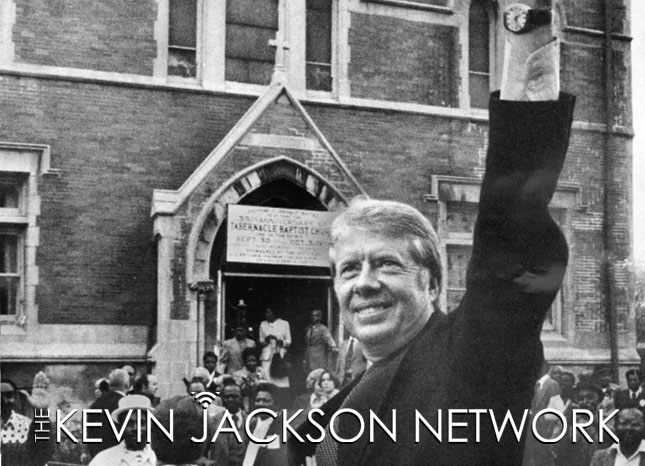The following article, Jimmy Carter: A Tale of Racism, Redemption, and Double Standards, was first published on The Black Sphere.
Jimmy Carter, often celebrated as a humanitarian and moral statesman, has a far more complicated past when it comes to race relations than many would care to admit.
Put simply: Carter was a racist.
Democrats like to gloss over Jimmy Carter’s racist past, because to look at him or hear him speak, he didn’t appear to be racist. Carter spoke with a warm and inviting Southern drawl that hid his embedded racism.
In his younger years, Carter worked hard to keep Georgia segregated, aligning with the racial attitudes prevalent among white Southern Democrats of the time. Like many in his party, when the political tide shifted, so did Carter’s stance—conveniently around the time he needed Black votes to climb the political ladder.
The Root described Carter’s early contradictions:
To call Carter’s early relationship with the Black community complicated, would be the understatement of the century. As a candidate for Georgia governor, Carter cozied up with avowed segregationists, earning himself a rather unflattering description from the premier state newspaper, the Atlanta Journal Constitution. In their opposition to his candidacy they called him “ignorant, racist, backward, ultra-conservative, red-necked South Georgia peanut farmer.”
But in his personal life, the rural Georgian politician had taken stances in favor of integration. At his Baptist church, Carter and his wife, the late Rosalynn Carter, were two of only three congregants to vote in favor of integration. (He later joined an integrated church, the Maranatha Baptist Church.) And as renewed segregationist sentiment swept through the South after Brown v. Board, Carter was one of the only white men in his community to refuse to join the local chapter of the white supremacist group, The White Citizens’ Council.
The clear contradictions didn’t go unnoticed by Black Americans, who overwhelmingly supported Carter’s primary opponent in the Georgia Governor’s race. But as evidenced by Black voters later support of Carter, his story doesn’t end there.
It’s hard to know exactly what changed with Carter. It’s possible that the fact he was no longer running in the Deep South meant he felt safe standing by the convictions he’d espoused in his personal life. But in his inaugural address as Governor in 1970, Carter hit a different note than his campaign, swearing “the time for racial discrimination is over.”
The truth is, Carter was a racist throughout much of his early life.
His political transformation didn’t stem from personal revelation but from necessity. As his ambitions grew, Carter became a textbook example of political pandering—suddenly championing racial equality when it became advantageous to do so.
Ultimately, Carter did evolve, proving that anyone is redeemable. But what a long and tortuous road it was. Moreover, consider the victims in his wake.
But imagine if Carter were a Republican. Would he have received such an easy pass?
Democrats and their allies in the media have a long history of excusing racist pasts within their ranks, while amplifying baseless accusations against Republicans. Take Donald Trump, for instance—never a proven racist, yet relentlessly attacked by the media and left-wing ideologues. The double standard is glaring, and it’s exhausting.
This isn’t just about Carter’s racial history. His record of appeasing America’s enemies has also been conveniently glossed over. As CNN’s Scott Jennings pointed out, Carter consistently sided with adversaries of the United States, further complicating his legacy.
@ScottJenningsKY: “In the run up to the Persian Gulf War, [Jimmy Carter] wrote letters, to all of our allies, and to Arab States, asking them to abandon their cooperation and coalition with the USA.. if it’s not treasonous, it’s borderline treasonous.”
pic.twitter.com/sSmx1O53OU
— Steve Guest (@SteveGuest) December 31, 2024
JENNINGS: In the run-up to the Persian Gulf War, he wrote letters to all of our allies and to Arab states, asking them to abandon their cooperation and coalition with the United States of America. If it’s not treasonous, it’s borderline treasonous, and so I hear what you’re saying about the humanitarianism, but when you’re an ex-president, and you have served in that office, I think you have a duty to the United States and only to the United States, and when he did that and other instances, to me, it showed that he cared more about his own legacy than he did about the country, and I think that is wrong.
How many people knew this of Carter?
I’m betting most people were unaware of Carter’s meddling, that frankly was treasonous.
It’s time for honest scrutiny across the political spectrum. Carter’s journey from segregationist to racial ally proves redemption is possible. However, his history also exposes the selective forgiveness reserved for Democrats. True accountability shouldn’t be partisan—it should be principled.
Continue reading Jimmy Carter: A Tale of Racism, Redemption, and Double Standards …

